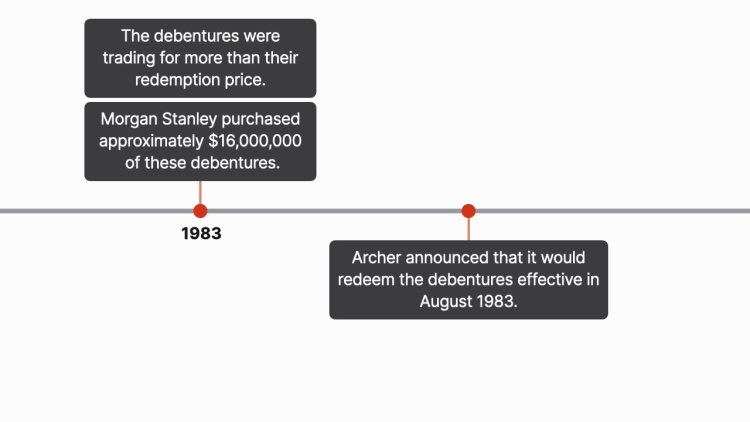Morgan Stanley & Co. v. Archer Daniels Midland Company
United States District Court for the Southern District of New York
570 F. Supp. 1529 (1983)

- Written by Sean Carroll, JD
Facts
Morgan Stanley & Company, Inc. (Morgan Stanley) (plaintiff) bought over $16 million in debentures from Archer Daniels Midland Company (ADM) (defendant). The indenture stated that ADM could not redeem the debentures “from the proceeds, or in anticipation, of the issuance of any indebtedness” if the interest rate for that indebtedness was under 16.08 percent. Right after Morgan Stanley’s purchase—although the timing was a coincidence—ADM called for the redemption of the debentures. The redemption was directly funded by two ADM common stock offerings; however, at around the same time, ADM had also raised money by borrowing significant amounts of capital at an interest rate of below 16.08 percent. Morgan Stanley brought suit, alleging that the redemption was funded at least indirectly from the proceeds from those loans, which because of the interest rate would have constituted a violation of the indenture agreement. The relevant language in the indenture was ambiguous boilerplate indenture language and thus, under Sharon Steel Corporation v. Chase Manhattan Bank, N.A., 691 F. 2d 1039 (1983), must be construed by the court as a matter of law so as to allow for uniform interpretation. Accordingly, both parties moved for summary judgment.
Rule of Law
Issue
Holding and Reasoning (Sand, J.)
What to do next…
Here's why 907,000 law students have relied on our case briefs:
- Written by law professors and practitioners, not other law students. 47,100 briefs, keyed to 996 casebooks. Top-notch customer support.
- The right amount of information, includes the facts, issues, rule of law, holding and reasoning, and any concurrences and dissents.
- Access in your classes, works on your mobile and tablet. Massive library of related video lessons and high quality multiple-choice questions.
- Easy to use, uniform format for every case brief. Written in plain English, not in legalese. Our briefs summarize and simplify; they don’t just repeat the court’s language.





